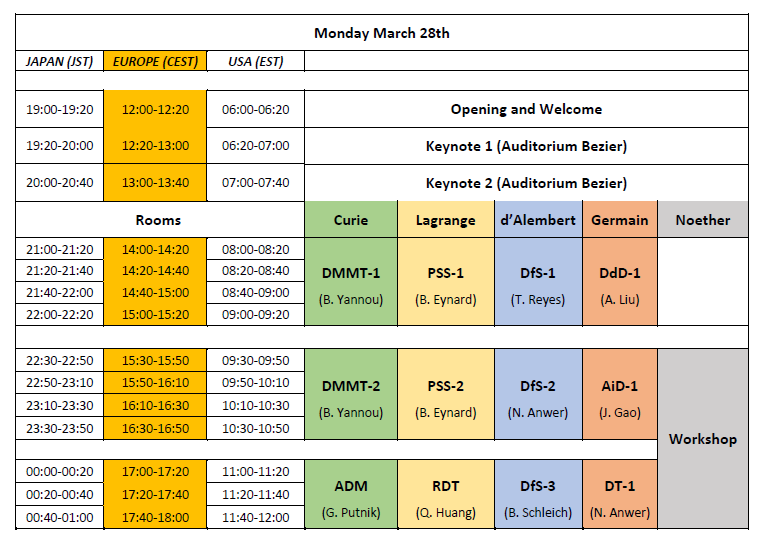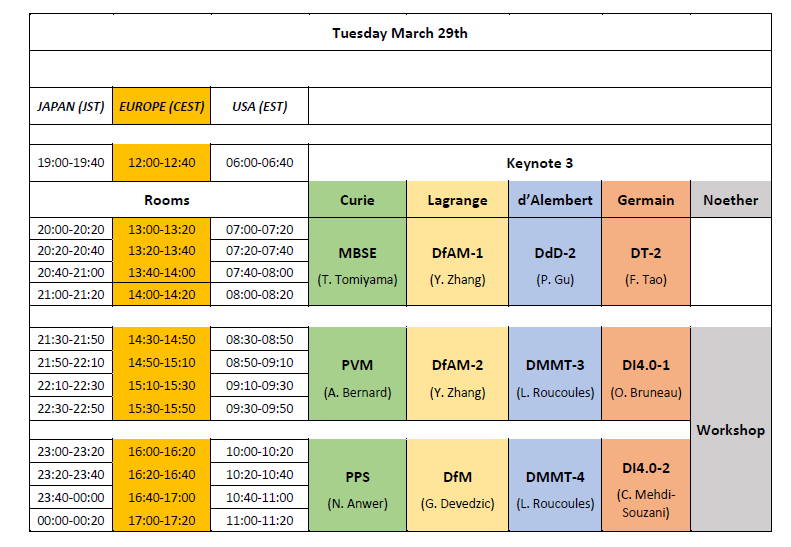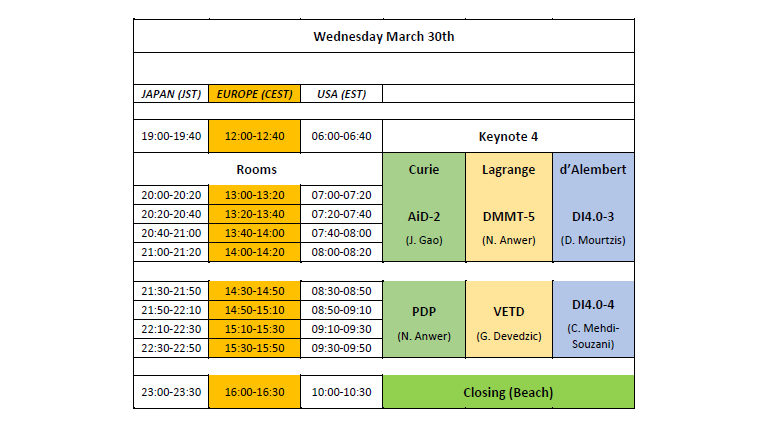Full Conference Program
The 32nd CIRP DESIGN 2022 Full Program can be downloaded in PDF here!
Conference Program Overview
| Day 1: 28/03/2022 | |
|---|---|

|
|
| Day 2: 29/03/2022 | |
|---|---|

|
|
| Day 3: 30/03/2022 | |
|---|---|

|
|
Sessions In Details
| DMMT: Design Methodology, Methods and Tools | |
|---|---|
|
DMMT-1 Ch: Bernard Yannou |
Presentation 1: Design as an echo of complexity in a designed world - A reflection on design Pedro Pinheiro, Goran D. Putnik, Zlata Putnik, Catia Alves Presentation 2: Knowledge Visualization: A Design centered Framework Aymane Sahli, Eujin Pei, Arthi Manohar, Richard Evans Presentation 3: An open science platform for benchmarking engineering design researches Romain Pinquié, Julien Le Duigou, Lou Grimal, Lionel Roucoules Presentation 4: Supporting Collaborative Innovation Processes in Smart Product Value Creation Networks Damun Mollahassani, Jonas Gries, Sven Forte, Jens C. Göbel |
|
DMMT-2 Ch: Bernard Yannou |
Presentation 1: Business-to-Analytics Canvas – Translation of Product Planning-Related Business Use Cases into Concrete Data Analytics Tasks Melina Panzner, Maurice Meyer, Sebastian von Enzberg, Roman Dumitrescu Presentation 2: Why to design modular products? Jarkko Pakkanen, Tero Juuti, Timo Lehtonen, Janne Mämmelä Presentation 3: Integrated Multilayer Architecture with Multi Interface Entity Model for Risk Management in Modular Product Design Roberto Riascos, Tomislava Majić, Egon Ostrosi, Jean-Claude Sagot and Josip Stjepandić Presentation 4: Why make it hard? - Usage of aggregated statistical data for risk assessment of damage scenarios in the context of ISO/SAE 21434 Sergej Japs, Frank Kargl, Harald Anacker, Roman Dumitrescu |
|
DMMT-3 Ch: Lionel Roucoules |
Presentation 1: Engineering is Design and only Design – Part I: The value of making a distinctive sign Goran D. Putnik, Zlata Putnik, Pedro Pinheiro, Cátia Alves Presentation 2: The EDiT method guideline - enabling distributed teams through situation-adequate method application Albert Albers, Katharina Duehr, Katharina Zech, Simon Rapp Presentation 3: Automated Design Workflow for Structural Nodes of Space Frame Structures Patrick Beutler, Manuel Biedermann, Urs Hofmann, Ralph Rosenbauer, Mirko Meboldt Presentation 4: Requirements analysis for an intelligent workforce planning system: a socio-technical approach to design AI-based systems Stefan Gabriel, Dominik Bentler, Eva-Maria Grote, Caroline Junker, David Meyer zu Wendischhoff, Michael Bansmann, Benedikt Latos, Daniela Hobscheidt, Arno Kühn, Roman Dumitrescu |
|
DMMT-4 Ch: Lionel Roucoules |
Presentation 1: Engineering is Design and only Design – Part II: Exploration through the inverse problem Goran D. Putnik, Zlata Putnik, Pedro Pinheiro, Cátia Alves Presentation 2: Improving distributed collaboration at Porsche Engineering Services GmbH through the application of the EDiT Method Katharina Duehr, Maximilian Burkhardt, Sebastian Endepols, Thomas Machauer, Albert Albers Presentation 3: A flexible approach for design rule formalization and evaluation Rob Salaets, Bieke Decraemer, Philip Eyckens, Wim Boudewyns, Ward Van Houdt, Koen Beyers Presentation 4: Introducing readiness scales for effective reuse of open source hardware Robert Mies, Martin Häuer, Mehera Hassan |
|
DMMT-5 Ch: Nabil Anwer |
Presentation 1: A combination forecasting method of grey neural network based on genetic algorithm Wei Wei, Chuan Jiang Presentation 2: Gaining insights through qualitative modelling – industrial project analysis with focus on derived hypotheses based on the contact and channel approach Patric Grauberger, Frank Bremer, Felix Pfaff, Peter Tröster, Thomas Nelius, Matthias Eisenmann, Thorsten Stöberl, Albert Albers, Sven Matthiesen Presentation 3: Research on user demand evolution model based on online product community Bo Rong,Wei Guo,Cong Cong Presentation 4: Spine pathologies detections: users’ requirements, technological development and first results Hugo Villi, Nicolas Pinsault, Guillaume Thomann |
| PSS: Product Service System | |
|---|---|
|
PSS-1 Ch: Benoit Eynard |
Presentation 1: Extracting the relationship between product-service system features and their implementation barriers based on a literature review Yutaka Inagaki, Yuya Mitake, Saeko Tsuji, Salman Alfarisi, Hanfei Wang, Yoshiki Shimomura Presentation 2: Towards Ecosystems with Smart Product-Service Systems Serdar Bulut, Reiner Anderl Presentation 3: A study of the rebound effect on the product-service system: Why should it be a top priority? Salman Alfarisi, Yuya Mitake, Yusuke Tsutsui, Hanfei Wang, Yoshiki Shimomura Presentation 4: Towards a correct by construction design of complex systems: The MBSS approach Pierre-Alain Yvars, Laurent Zimmer |
|
PSS-2 Ch: Benoit Eynard |
Presentation 1: Value Creation Framework and Roles for Smart Services Jannik Reinhold, Christian Koldewey, Roman Dumitrescu Presentation 2: A conceptual framework for through-life services in industrial machinery Elaheh Maleki, Farouk Belkadi, Alain Bernard Presentation 3: Understanding the relationship between Product-Service System value and operational data using network graphs Carl Nils Konrad Toller, Raj Jiten Machchhar, Alessandro Bertoni, Marco Bertoni, Taylor Sorgini Presentation 4: Design for excellence to explore complex product service systems: A case study Geir Ringen, Kristin L. Landsem, Halvor Holtskog |
| PPS: Product Production System | |
|---|---|
|
PPS Ch: Nabil Anwer |
Presentation 1: Synchronization of car body requirements for the design of new product and production modules: A multi-methodological approach Eduard Wagner, Bernd Keller, Hans-Friedrich Jacobi, Dieter Spath Presentation 2: Product-Production-CoDesign: An Approach on Integrated Product and Production Engineering Across Generations and Life Cycles Albert Albers, Gisela Lanza, Monika Klippert, Louis Schäfer, Alex Frey, Fynn Hellweg, Philip Müller-Welt, Moritz Schöck, Carmen Krahe, Konstantin Nowoseltschenko, Simon Rapp Presentation 3: Product Design for Matrix-Structured Manufacturing Systems Christian P. Nielsen, Fei Yu Presentation 4: Analysis of Factors Influencing Knowledge Transfer between the Product and Production System Development as well as Production Monika Klippert, Alexandra Preißner, Hendrik Rust, Albert Albers |
| DfS: Design for Sustainability | |
|---|---|
|
DfS-1 Ch: Tatiana Reyes |
Presentation 1: Environmental emissions and cost vs. intermodal transportation technological development trade-off for the design of woody biomass supply chain Seyed Mojib Zahraee, Nirajan Shiwakoti, Peter Stasinopoulos Presentation 2: Combining life cycle assessment and online customer reviews to design more sustainable products – Case study on a printing machine Michael Saidani, Junegak Joung, Harrison Kim, Bernard Yannou Presentation 3: Exploring the applicability of circular design criteria for electric vehicle batteries Aitor Picatoste, Daniel Justel, Joan Manuel F. Mendoza Presentation 4: For an upscaling assessment integration in product design Lucas Riondet, Maud Rio, Véronique Perrot-Bernardet, Peggy Zwolinski |
|
DfS-2 Ch: Nabil Anwer |
Presentation 1: Design rules for environmental sustainability: the case of refrigeration blocksystems Manes Francesca, Rossi Marta, Germani Michele Presentation 2: Proposal of a strategic model to unlock the circular potential in industrial practice Luca Benini, Yann Leroy, Tullio Tolio, Maria Chiara Magnanini Presentation 3: SyProLei – A systematic product development process to exploit lightweight potentials while considering costs and CO2 emissions Jerome Kaspar, Kristian König, Johannes Scholz, Steven Quirin, Sven Kleiner, Jürgen Fleischer, Hans-Georg Herrmann, Michael Vielhaber |
|
DfS-3 Ch: Benjamin Schleich |
Presentation 1: Design for Reuse: residual value monitoring of power electronics’ components Boubakr Rahmani, Maud Rio, Yves Lembeye, Jean-Christophe Crebier Presentation 2: A model for long-distance mobility with battery electric vehicles: a multiperspective analysis Julien Baltazar, Flore Vallet, Julien Garcia Presentation 3: Ecodesign with topology optimization Edouard Duriez, Joseph Morlier, Catherine Azzaro-Pantel, Miguel Charlotte |
| DdD: Data-driven Design | |
|---|---|
|
DdD-1 Ch: Ang Liu |
Presentation 1: An ontology-based product usage context modeling method for smart customization Xingzhi Wang, Ang Liu, Sami Kara Presentation 2: Concept for the identification of product innovation potentials by the application of text mining Michael Riesener, Maximilian Kuhn, Hendrik Lauf, Sathish Manoharan, and Günther Schuh Presentation 3: Information mining of customers preferences for product specifications determination using big sales data Jian Zhang, Peihuang Lin, Alessandro Simeone Presentation 4: Semantic knowledge management system for design documentation with heterogeneous data using machine learning Jack Gammack, Haluk Akay, Ceylan Ceylan, Sang-Gook Kim |
|
DdD-2 Ch: Peihua Gu |
Presentation 1: Natural Language Processing in assistance to Inventive Design activities Daria Berdyugin, Denis Cavallucci Presentation 2: A data-driven adaptive design for achieving sustainable product Hui Sun, Wei Guo, Lei Wang, Mao Lin Presentation 3: Exploiting patent knowledge in engineering design: a cognitive basis for remodeling patent documents Chris McTeague, Anna Chatzimichali Presentation 4: Knowledge and engineering parameter mapping technology supporting product conceptual design Zhenchong Mo, Lin Gong, Fan Ye, Tie Fu, Degang Zhu, Haoran Cui, Jian Xie |
| AiD: AI in Design | |
|---|---|
|
AiD-1 Ch: James Gao |
Presentation 1: Model Building for better Transfer of AI Systems using Reinforcement Learning from Simulation to the Physical World Till Blüher, Harold Billiet, Rainer Stark Presentation 2: AI based geometric similarity search supporting component reuse in engineering design Carmen Krahe, Milan Marinov, Theresa Schmutz, Yannik Hermann, Mike Bonny, Marvin May, Gisela Lanza Presentation 3: Simplified Learning of CAD Features Leveraging a Deep Residual Autoencoder Raoul Schönhof, Jannes Elstner, Radu Manea, Steffen Tauber, Ramez Awad, Marco F. Huber Presentation 4: Adhesive selection via an interactive, user-friendly system based on Symbolic AI Jeroen Jordens, Simon Vandevelde, Bart Van Doninck, Maarten Witters, Joost Vennekens |
|
AiD-2 Ch: James Gao |
Presentation 1: The Evolution, Framework, and Future of Cognitive Intelligence-enabled Product Design Wang Zuoxu, Liu Jihong, Zheng Lianyu Presentation 2: A kernel transfer learning based multi-sensor surface reconstruction framework for reverse engineering Gengxiang Chen, Yingguang Li, Charyar Mehdi-Souzani, Xu Liu Presentation 3: A Knowledge Discovery Method of Product Design Requirements Based on Pattern Matching Wei Wei, Chenliang Hao Presentation 4: AI-Based Failure Management: Value Chain Approach in Commercial Vehicle Industry Robin Guenther, Sebastian Beckschulte, Martin Wende, Hendrik Mende, Robert H. Schmitt |
| ADM: Agile Design Methodologies | |
|---|---|
|
ADM Ch: Goran Putnik |
Presentation 1: Method for direct end customer integration into the agile product development Lynn Humpert, Benjamin Röhm, Harald Anacker, Roman Dumitrescu, Reiner Anderl Presentation 2: Linking Testing Activities with Success in Agile Development of Physical Products Martin Batliner, Stefan Boës, Johannes Heck, Mirko Meboldt Presentation 3: Systematic derivation of customized development sprints for an agile development of wind turbines Michael Riesener, Maximilian Kuhn, Hendrik Lauf, Gereon C. Bönsch, Günther Schuh |
| RDT: Robust Design and Tolerancing | |
|---|---|
|
RDT Ch: Qiang Huang |
Presentation 1: Concurrent Machine and Batch Size Selection in Sampling-based Tolerance-Cost Optimization Martin Roth, Benjamin Schleich, Sandro Wartzack Presentation 2: Data-driven deviation design for non-ideal surfaces of Skin Model Shapes Yifan Qie, Nabil Anwer Presentation 3: Geometric Variability in Parametric 3D Models: Implications for Engineering Design Aritz Aranburu, Daniel Justel, Manuel Conterob Jorge D. Camba |
| DT: Digital Twin | |
|---|---|
|
DT-1 Ch: Nabil Anwer |
Presentation 1: Digital Twins of Operational Scenarios in Mining for Design of Customized Product-Service Systems Solutions Alessandro Bertoni, Raj Jiten Machchhar, Tobias Larsson, Bobbie Frank Presentation 2: Digital infrastructures as the basis for implementing digital twinning Maaike Slot, Maikel Fraikin, Roy Damgrave, Eric Lutters Presentation 3: A Digital Twin Design for Maintenance Optimization Oliver Davies, Abhishek Makkattil, Ce Jiang, Maryam Farsi |
|
DT-2 Ch: Fei Tao |
Presentation 1: Manufacturing Service Network of Digital Twin Systems Under Cloud Computing Environment Feng Xiang,Ping Zhou,Ying Zuo,Fei Tao,Dashun Zhang Presentation 2: A Conceptual Model-based Digital Twin Platform for Holistic Large-scale Railway Infrastructure Systems Shiyang Zhou, Stefan Dumss, Rebecca Nowak, Rainer Riegler, Ozan Kugu, Martin Krammer, Manfred Grafinger Presentation 3: A digital twin framework for product to-be-designed analysis based on operation data Siqi Li, Junfeng Wang, Jin Rong, Wei Wei Presentation 4: Personalized PSS Design Optimization based on Digital Twin and Extended Reality Dimitris Mourtzis, John Angelopoulos, Nikos Panopoulos |
| MBSE: Model-Based System Engineering | |
|---|---|
|
MBSE Ch: Tetsuo Tomiyama |
Presentation 1: Approach for model-based requirements engineering for the planning of engineering generations in the agile development of mechatronic systems Emily Windisch, Constantin Mandel,Simon Rapp, Nikola Bursac, Albert Albers Presentation 2: Heterogeneous models to Support Interdisciplinary Engineering – Mapping Model Elements of SysML and CAD Thomas Schumacher, David Inkermann Presentation 3: Security- and Safety-Driven Functional Architecture Development Exemplified by Automotive Systems Engineering Aschot Kharatyan, Matthias Günther, Harald Anacker, Sergej Japs, Roman Dumitrescu Presentation 4: Classification of Simulation Models for the Model-based Design of Plastic-Metal Hybrid Joints Kathrin Spütz, Julius Berges, Georg Jacobs, Joerg Berroth, Christian Konrad |
| PVM: Product Variant Management | |
|---|---|
|
PVM Ch: Alain Bernard |
Presentation 1: Productization as a link to combining product portfolio management and product family development Janne Mämmelä, Erno Mustonen, Janne Härkönen, Jarkko Pakkanen, Tero Juuti Presentation 2: How to manage vehicle platform variants? A method to assess platform variance through competitive analysis C. Frank, L. Holsten, T. Şahin, T. Vietor Presentation 3: Where variants and familiarity meet: portfolio management in companies that design and produce Laura Nieuwmeijer, Eric Lutters Presentation 4: Methodology for identifying and increasing order-neutral components Thomas Bauernhansl, Philipp Moessner, Philipp Busch, Timmo Hansla |
| DfAM: Design for Additive Manufacturing | |
|---|---|
|
DfAM-1 Ch: Yicha Zhang |
Presentation 1: Deep Learning for Additive Manufacturing-driven Topology Optimization Waad ALMASRI, Florence DANGLADE, Dimitri BETTEBGHOR, Faouzi ADJED, Fakhreddine ABABSA Presentation 2: Lightweight design of automotive components using generative design with fiber-reinforced additive manufacturing Stefan Junk, Nils Rothe Presentation 3: A method for design for additive manufacturing rules formulation through Spatio-temporal process discretization Chloe Douin, Elise Gruhier, Robin Kromer, Olivier Christmann, Nicolas Perry Presentation 4: A two-step parametric generative method for heat exchangers design in additive manufacturing Ning Li, Jean-Michel Hugo, Damien Serret, Yicha Zhang, Samuel Gomes |
|
DfAM-2 Ch: Yicha Zhang |
Presentation 1: Approach to optimize the interlayer waiting time in additive manufacturing with concrete utilizing FEM modeling Virama Ekanayaka, Lukas Lachmayer, Annika Raatz, André Hürkamp Presentation 2: Design guidelines for the separation of components to combine the potentials of additive and conventional manufacturing processes Jannik Reichwein, Johannes Geis, Kris Rudolph, Eckhard Kirchner Presentation 3: A powder delivery system for large-scale DED machines CPanagiotis Stavropoulos, Harry Bikas, Theodoros Bekiaris Presentation 4: Experimental investigation of the impacts of fibre routing strategy on the properties of composite printing Valentin Marchal, Yicha Zhang, Nadia Labed, François Peyraut |
| DI4.0: Design for Industry 4.0 | |
|---|---|
|
DI4.0-1 Ch: Olivier Bruneau |
Presentation 1: Situational Risk Assessment Design for Autonomous Mobile Robots Manuel Müller, Golsa Ghasemi, Nasser Jazdi, Michael Weyrich Presentation 2: Designing a digitalized cell for remanufacturing of automotive frames Panos Stavropoulos, Alexios Papacharalampopoulos, Lydia Athanasopoulou, Konstantinos Kampouris, Panagiotis Lagios Presentation 3: Overcoming the Sim-to-Real Gap in Autonomous Robots Pascalis Trentsios, Mario Wolf, Detlef Gerhard Presentation 4: Toward designing an integration architecture for a mobile manipulator in production systems: Industry 4.0 Nooshin Ghodsian, Khaled Benfriha, Adel Olabi, Varun Gopinath , Aurelien Arnou, Chawki El zant, Quentin Charrier, Marwan El helou |
|
DI4.0-2 Ch: Charyar Mehdi-Souzani |
Presentation 1: Cross-industry methods for strategic planning of the digital transformation of small and medium sized enterprises Magdalena Förster, Christian Kürpick, Daniela Hobscheidt, Arno Kühn, Roman Dumitrescu Presentation 2: Implementation of Artificial intelligence for maintenance operation in the rail industry Ilesanmi Daniyan, Khumbulani Mpofu, Rumbidzai Muvunzi, Ikenna Damian Uchegbu Presentation 4: Knowledge-Based Integration of Product Data in IoT-Platforms to Optimize Resource Efficiency Niklas Quernheim, Stefan Kugler, Reiner Anderl Presentation 4: Developing circular business models: LCA and strategic choice Oda Ellingsen, Sigurd Sagen Vildåsen |
|
DI4.0-3 Ch: Dimitris Mourtzis |
Presentation 1: Complexity-oriented design for cyber-physical systems Michael Riesener, Maximilian Kuhn, Alexander Keuper, Jan Schuhmacher and Guenther Schuh Presentation 2: Towards design guidance for the digitalisation of work instructions by focusing on technological possibilities and industrial requirements Rieke Leder, Hendrik Stern, Michael Freitag Presentation 3: Recommender systems for Personalized Work Instructions Jeroen Zegers, Vasilios Zogopoulos, Dries Verhees Presentation 4: Social Network-based Education and Education 3.0: Application for education on Design and teaching of Industry 4.0 concepts Goran Putnik, Cátia Alves |
|
DI4.0-4 Ch: Charyar Mehdi-Souzani |
Presentation 1: Integration of Communication using OPC UA in MBSE for the Development of Cyber-Physical Systems Johannes Olbort, Benjamin Röhm, Vladimir Kutscher, Reiner Anderl Presentation 2: Integrating deep learning and rule-based systems into a smart devices decision support system for visual inspection in production Hendrik Mende, Alexander Peters, Faruk Ibrahim, Robert H. Schmitt Presentation 3: Increased efficiency in virtual commissioning with automated model generation based on component libraries Nicolas Pyschny, Ben Rudat, Eike Permin Presentation 4: In-Situ Condition Monitoring in Timing Belts for Automation Purposes – Challenges and Opportunities Yanik Koch, Raphael Weller, Peter Welzbacher, Eckhard Kirchner |
| DfM: Design for Manufacturing | |
|---|---|
|
DfM Ch: Goran Devedzic |
Presentation 1: Considering Manufacturing in Functional Modelling – Case Study on Combination of Simulation-Driven Design with Design-for-Manufacture Patric Grauberger, Tim Bruchmüller, Sebastian Zimprich, Sven Matthiesen Presentation 2: Adaptive CAM Planning to Support Co-Design Alexander Reichle, Carsten Ellwein, Alexander Verl Presentation 3: Knowledge graph for manufacturing cost estimation of gear shafts – a case study on the availability of product and manufacturing information in practice Fynn Hellweg, Harry Brückmann, Thomas Beul, Constantin Mandel, Albert Albers Presentation 4: Implementation of Surface Interpolators for Compound Surfaces without C2-continuity Anja Elser, Armin Lechler, Alexander Verl |
| PDP: Product Development Process | |
|---|---|
|
PDP Ch: Nabil Anwer |
Presentation 1: Improving engineering change management by introducing a standardised description for engineering changes for the automotive wiring harness Moritz Altner, Hans Redinger. Benjamin Valeh, Eder Kevin,Jonas Neckenich, Simon Rapp, Roland Winter, Albert Albers Presentation 2: Construction and Implementation of Matter-Element Matching Model for Research and Development Tasks and Resources Zhizhong Cheng, Daming Li, Yuhu Li, Zhicheng Huang, Lihong Qiao Presentation 3: Methodical approach for manufacturing-oriented concept development for Tailored Textiles Sebastian Stein, Georg Jacobs, Ricarda Riedel, Julius Steinlein, Kathrin Spütz, Christian Konrad Presentation 4: Using Lean to Transform the Product Development Process in a Marine Company: A Case Study Elisabeth Lervåg Synnes, Torgeir Welo |
| VETD: Virtual Environments and Testing in Design | |
|---|---|
|
VETD Ch: Goran Devedzic |
Presentation 1: Comparing design review outcomes in immersive and non-immersive collaborative virtual environments Nikola Horvat, Tomislav Martinec, Marija Majda Perišić, Stanko Škec Presentation 2: FEM as a Package Design Tool for Corrugated Paperboard Susanna Heposalmi, Sami Matthews, Ville Leminen, Juha Varis, Amir Toghyani Presentation 3: VR in Distributed Product Development – Approach for a Heuristic Profitability Assessment Hans-Patrick Balzerkiewitz, Carsten Stechert Presentation 4: A virtual testing methodology for the identification of optimal parametric concept models in multi-bolted composite applications Carlos Lopez, Jan Stroobants |
